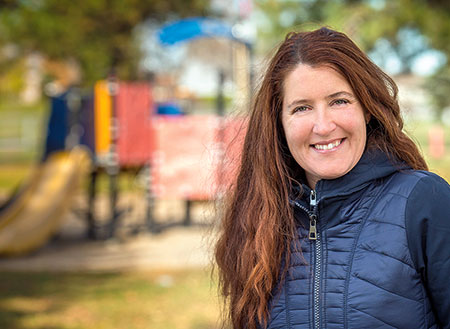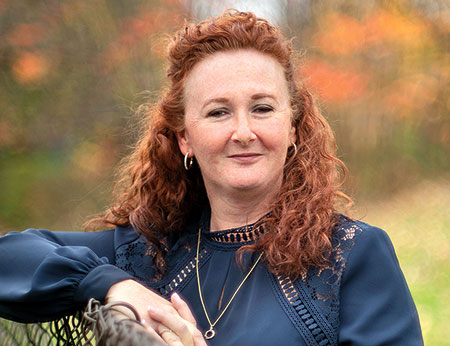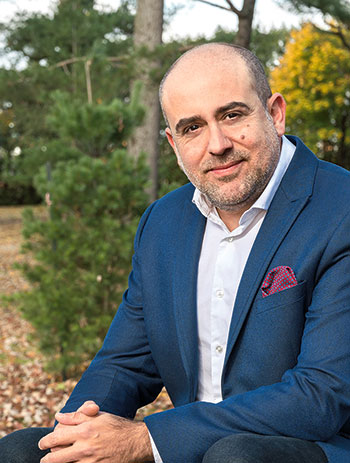In the fall of 2020, 82.4% of home care educators (HCEs) approved the agreement in principle reached by the FIPEQ-CSQ[1] and the Minister of Families. The agreement having been newly accepted, the Federation now begins negotiations for CPEs2.
For home care educators, as for CPEs, negotiations are led by people with heart and conviction. The following is an interview with bargaining representatives for the Syndicats des intervenantes en petite enfance (SIPE) and the Alliances des intervenantes en milieu familial (ADIM).
EARLY CHILDHOOD CENTRES (SIPE SECTOR)
CSQ Le Magazine: What do you think are the best qualities of a good negotiator?
Michelle L’Heureux (ML)[3]: Without a doubt, active listening. As a spokesperson, it’s essential to listen to the members we represent and their needs. That said, we must also listen to the employer to fully understand their positions and the negotiating issues. This will help identify possible solutions to achieve our union objective.
What are the main issues in the current negotiation?

Anne-Marie Bellerose (AMB)[4]: Workforce attraction and retention, for sure! These issues are at the heart of our priorities and definitely require better working conditions. The survival of our network depends on it. Nowadays, many of our workers are leaving. To retain them, we need conditions equal to the exceptional work they do every day with children.
During the previous negotiations, we maintained gains we had made, but did not make any new ones, particularly following budget cuts in childcare centres. Therefore, we are in a catch-up and solutions mode!
Why should the population support staff in childcare centres?

AMB: Early childhood is the first step in education. Childcare workers play an essential role in the education of our toddlers. They work in partnership with parents to ensure the optimal development of their children. Thus, to recognize their work, it’s important to support them collectively. We can’t forget that an educated society is a healthy society! Every dollar invested in early childhood education brings in $7.00 in economic benefits.
ML: It’s also been shown that the quality of the regulated and subsidized early childhood education services network, a network that allows many women to access the labour market, is mostly dependent on the working conditions of its employees. Hence the importance of improving these conditions and supporting these workers in their demands.
What are the tangible impacts of budget cuts in childcare centres on the quality of services for our little ones?
AMB: First, the cuts have contributed mainly to burning out staff who are working twice as much. It’s simple, the smaller the CPE’s budget, the more difficult it is to access additional human resources and educational materials. Workdays and workweeks are longer. Positions have been abolished and tasks have been redistributed, which sometimes forces workers to put pedagogy aside to focus on housekeeping responsibilities.
The impact is also felt in children with special needs. Access to resources and special educators has been drastically reduced due to budget cuts, which prevent staff hiring.
What are the benefits of being affiliated with the FIPEQ-CSQ at the start of negotiations?
AMB: Being affiliated with the FIPEQ-CSQ and the CSQ gives us access to many professional resources, as well as their expertise and knowledge, to support us in our demands and to accompany us at the negotiating table. This increases our balance of power.
Also, we can count on the solidarity of other federations at all times. That’s a big plus!
HOME CARE EDUCATORS (ADIM SECTOR)
CSQ Le Magazine: While you were in the midst of negotiations, what significant challenges have you had to overcome?

Mélanie Piché (MP)[5]: A major challenge has undoubtedly been that of negotiating while the public sector negotiations, which concern more than 550,000 workers, are still underway. It hasn’t worked in our favour. Our counterparts have been very reluctant to improve our working conditions for fear of having to grant the equivalent to government employees.
Kamel Khiari (KK)[6]: Also, as with every negotiation, the law limits the matters we can negotiate. For example, our collective agreement cannot relate to a rule established in the Educational Childcare Act or its regulations, even if they affect our members' working conditions.
Did you encounter any unexpected obstacles?
MP: Oh, yes! The pandemic has been an unknown we had to face collectively. In addition to the fear of a decree that would prohibit us from taking concerted action, we had to review our strategy because of the devastating consequences that COVID-19 has had on the Québec economy. Luckily our negotiating team was reliable and experienced, otherwise, I don’t think we would have made it through!
What were the main demands in this negotiation?

KK: In short, a decent salary and better working conditions. We demanded and still demand real recognition for HCEs, the work they do every day, and their experience. Even though we did not reach our initial objective of $16.75 an hour, we agreed with the Minister of Families on the establishment of a compensation committee for HCEs. This committee will make recommendations and adjustments will take place during the period covered by this collective agreement.
What does an indefinite general strike like the one led by HCEs mean for them?
MP: This represents a considerable challenge. First, because they are not paid on days they close and second, they risk losing clients because they are self-employed. HCEs, therefore, rely on collective strength to move discussions ahead at the negotiating table.
In what way did the mobilization of members and the population's support make a difference at the negotiating table?
MP: The mobilization made all the difference! It’s the reason why we’ve made such gains. The solidarity of our members during the indefinite general strike certainly took Minister Mathieu Lacombe by surprise.
KK: I would add that, without this strong mobilization, the FIPEQ-CSQ would hardly have benefited from such a strong media presence during these negotiations. This attention has led the population to support the cause of HCPs, a cause that has become a social one. Thus, the Minister could not help but improve his offer!
1 Fédération des intervenantes en petite enfance du Québec
2 Centres de la petite enfance.
3 Michelle L’Heureux is a FIPEQ-CSQ advisor and spokesperson for national negotiations for the SIPE sector.
4Anne-Marie Bellerose is FIPEQ-CSQ secretary-treasurer and responsible for negotiations for the SIPE.
5 Mélanie Piché is FIPEQ-CSQ vice-president and responsible for negotiations for the ADIM.
6 Kamel Khiari is a FIPEQ-CSQ advisor and ADIM spokesperson for negotiations.

